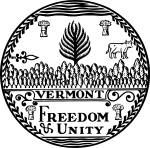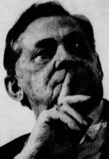| |||||||||||||||||||||
| |||||||||||||||||||||
 Results by city council district before recount
Sanders: Sanders—40–50% Sanders—50–60%
Paquette: Paquette—40–50% | |||||||||||||||||||||
| |||||||||||||||||||||
| Elections in Vermont |
|---|
 |
The 1981 Burlington mayoral election was held March 3, 1981. Bernie Sanders, who ran as an independent candidate, defeated incumbent Democratic Mayor Gordon Paquette, who was seeking a sixth term as Mayor of Burlington, Vermont, and Richard Bove.
Paquette had easily won reelection to the mayoralty in the 1973, 1975, and 1979 elections and the Democratic Party controlled ten of the thirteen city council seats. Sanders ran in the election due to the amount of support he received in Burlington during his 1976 gubernatorial campaign. Bove initially ran as a Democrat, but became an independent after losing in the primary to Paquette. The Republican Party did not field a candidate and the Citizens Party endorsed Sanders after failing to run Greg Guma. Sanders initially led Paquette by twenty-two votes, but his total vote lead was later decreased to ten votes following a recount.
Sanders' victory was the first time a socialist was elected mayor of a jurisdiction in New England since the election of Jasper McLevy as mayor of Bridgeport, Connecticut during the 1950s. Sanders would later be reelected as mayor in the 1983, 1985, and 1987 elections before being elected to the United States House of Representatives in 1990 and then the United States Senate in 2006.[1]
- ^ "SANDERS, Bernard". United States House of Representatives. Archived from the original on December 3, 2020. Retrieved December 3, 2020.


